 After performing at the Trevor Project benefit Friday night in New York, out Broadway star Nick Adams, 28, chatted with Queerty on the Bowery Hotel’s the topiary-heavy patio.
After performing at the Trevor Project benefit Friday night in New York, out Broadway star Nick Adams, 28, chatted with Queerty on the Bowery Hotel’s the topiary-heavy patio.
While smokers puffed away nearby, Adams—who has dazzled audiences in A Chorus Line, Guys & Dolls, and La Cage aux Folles—sipped on a vodka and soda and fielded some of our queries, ranging from his 2008 feud with Mario Lopez to how Midwestern evangelicals respond when they see Priscilla Queen of the Desert, the very gay Broadway show he’s currently starring in.
Queerty: Let’s talk gossip. You and Mario Lopez have had some drama in the past—there was a New York Post item where he supposedly told you to go to the back of the stage in A Chorus Line, so you wouldn’t upstage him. Was that manufactured by the press?
Nick Adams: I mean it’s ridiculous! (Laughs) I’m very good friends with him. I set him up with his fiancée—the mother of his child.
How about we take this to the next level?
Our newsletter is like a refreshing cocktail (or mocktail) of LGBTQ+ entertainment and pop culture, served up with a side of eye-candy.
You set him up with Courtney Mazza?
I’ve known her for over ten years, and she was in A Chorus Line with me. I went with them on their first date. We were never feuding. There was never a fight between the two of us!
So the whole story about making you wear a hoodie to hide your muscles was made up?
When he joined the show, it was beneficial to all of the cast members because it helped us run another six months. So I’m not going to be upset about celebrities, I understand the point of star casting, he came in he helped us run longer, and I got paid longer. He wouldn’t specifically say it to my face, “I’m gonna put you in a different costume.” He would have talked to our producers and our wardrobe team. They may have changed my costume and put me in the back but, like, I still got paid so I’m not mad about that.
And now you’re in a huge Broadway smash. How long do you expect Priscilla to run on Broadway? It’s had a really solid run right now, but Broadway can be a capricious beast.
Yeah, we just celebrated our one-year anniversary last week.
You think it’s going to go two, three, four more years?
I always think it’s a gamble to predict how long a Broadway show is going to run but we’ve been doing well. Given the fact that we weren’t nominated for Best New Musical, we’ve really kinda defied the odds with the season last year—a lot of shows closed and opened up since then.
Did you feel cheated by not getting the nomination?
The Tony Awards are very political, and I learned that over the years of doing new shows what the critics like and what the Tony voters like. and it’s a much more political beast than about awarding excellence, which was the idea I had of it while I was growing up.
Is it more political then, say, the Oscars?
It’s all money-driven really so, um, I think it’s probably on a smaller scale but in the same sense.
The Trevor Project is about helping LGBT kids who are at risk. I know the cast of Priscilla gets a lot of letters from teens saying the show’s helped them come out or that it educated their parents about the gay community.
Yeah, that’s why I was excited to become involved with the Trevor Project. The message of our show is really parallel to what the Trevor Project is all about: acceptance. A lot of LGBT youth come to see the show and they’ll write us emails and send us letters and say that you know the show has affected them in such a large way, they now feel like their an individual and can celebrate who they are, feel like they belong to a community. And I’ve never been part of a production or anything that’s really touched people in the way this show does.
At the end of the show we always sing “We Belong” and “I Will Survive.” And I think anybody that’s struggling—I mean in any community, but especially LGBT kids—can come see our show and look at this crazy three drag queens traveling through the desert, and people dressed as flowers and animals and koalas and get caught up in the world, and realize we celebrate individuality.
It’s a testament to the show that it can draw those conservative crowds from the Heartland and be super-successful. Have you ever had any fundamentalists say Priscilla has changed their views?
We have a lot of Midwest families that will be at the stage door afterwards or we will see them in the audience, you know. What’s incredible about the show, I think, is at the beginning a lot of people are not familiar with the film the show is based on, so they come not knowing what to expect. They see that Bette Midler is our producer, and they see that it’s big and flashy and that attracts them to it. So at the beginning they realize they are going to see a story about three gay men, three drag queens, one transvestite on top of that, a transsexual on top of that.
Plus a gay guy with a son on top of that!
What we love to see is when people come to see the show from the Midwest and have a misconception of what it might be about or they don’t know anything about it. And by the end of the show they are rooting for the three central characters. With a straight dad, who might be uber-Christian—to have him feeling for our characters and rooting for us, then I know that we told a story, we did our job, you know. It’s universal in that way everyone can pull something from the show, and also take a different look at the LGBT community then they did before they came in to see it.
 Okay, on a totally superficial level, we have to ask: How do you get that body? Because we all go out and drink our vodka sodas and go to the gym, but we don’t look like you!
Okay, on a totally superficial level, we have to ask: How do you get that body? Because we all go out and drink our vodka sodas and go to the gym, but we don’t look like you!
I do a workout called Priscilla Queen of the Desert eight times a week. That’s what I do.
Do you have a trainer?
I like to have a trainer. I’ll get stuck doing the same exercises every day, too. But I feel the best way I see results with my body is to have a trainer mix things up and challenge me in different ways, then I notice the next week, “wow I’ve really progressed.”
We see you around the city a lot and people generally leave you alone. Is it weird that Broadway doesn’t always equal celebrity or do you prefer your privacy?
My goal was to become an actor—a performer, an entertainer. I didn’t set out my goal as a child to become famous to become a celebrity. I think that’s a whole other beast. People are famous today for absolutely nothing, for having no talent, no contribution to society. I mean look at reality television—those people become stars in a way and are absolutely famous, but for what?
I like that I’m recognized for the work that I do, and I’m proud of the shows I’ve been a part of. And for me that’s more than enough. I get to reach people, like with the Trevor Project. This platform on Broadway has allowed me to reach way more people in my life then I ever thought possible. So for me that’s more than enough, you know?


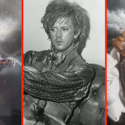

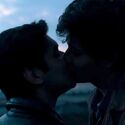


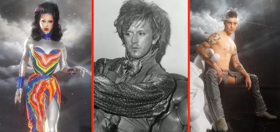
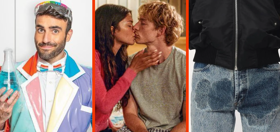
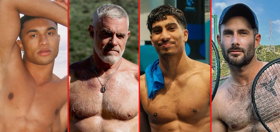
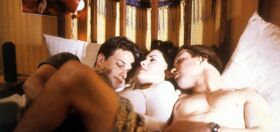
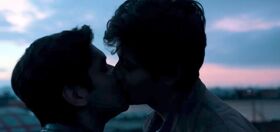





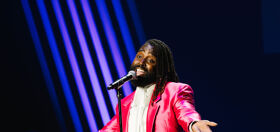
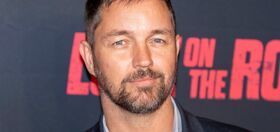
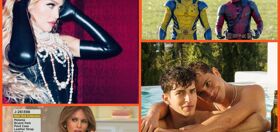
philly
who is this guy?? and why does he wear so much makeup.
Larry
@philly: he is made up for a broadway show…duh
David1950
Utterly pointless, but then again what else can we expect from queerty and their horrible interviewers? This has NOTHING to do with GLBT rights, GLBT people, and GLBT equality.
FunMe
Saw him in Priscilla last Fall … loved him! He is a very talented man and was a lot of fun in his role.
He’s also a cutie with a great smile!
Lisa Cuddy
We’ve loved NICK ADAMS for years. He’s an incredibly talented actor/singer/dancer but he also gives so much back to the GLBT community. He’s tireless in his efforts to help.
Alexa
@David1950: not everything has to be about LGBT rights, it’s ok to have a little fun sometimes. All work and no play… Anyway, as Nick Adams is gay and Priscilla is about the gayest show on Broadway it IS about LGBT people.
Thanks for the interview. Love Nick Adams, he’s very talented, and I loved him in Priscilla.
Muleskinner
He has weird looking hair and wear too much makeup for a boy.
JAW
I guess only positive comments are welcome… a bit of censoring is going on
Larry
@Muleskinner: so you know…new new york city they have this place called broadway and they have these shows called musicals where people put on costumes and were make and they sings on stage…a wonder to behold
Jack Jett
When talking of Lopez, he sounds like a Republican reading his official talking points.
Is this what he means by the Tony’s being too political?
timucua
@ Larry nice one, LOL.
TonyC
There is a certain “decorum” a person must maintain in any profession but especially when you are in the public eye. Nick is one of the sweetest guys.Let me just say honestly to everyone, this has nothing to do with Nick being Gay,getting the underwear job etc..he is the “REAL THING”, a Gentleman who knows ,with superb manners, how to handle himself..that’s what impressed me the most. I was on Fire Island that Summer and he performed a couple of songs,made some comments….I wasn’t looking at him with any sexual innuendoes at all because I knew,whatever was said, things “went down”on in that Theater.You must bow down to the star because it will make you more bucks to pay the rent! but he was gracious through the entire episode, no matter what he says. Now about 6 months ago, Mario’s showing up in some underwear ads and they were not top of the line.It just left a bad “taste in my mouth” and I guess if you’re built MENTALLY like Mario, you must fight for everything in a career, on the other hand. Nick,like all people in his niche,always has to fight,audition for parts…he’s the true sense of Broadway and I have been going to Broadway shows for over 40 years now..he’s a RARE GEM!
I must get my RUMP up to to see Priscilla before it closes…
XO
Tony(NYC)
streetsmart
After holding off for months because it just didn’t seem appealing I saw “Priscilla” and LOVED it. I talked with lots of tourist who had seen it and they raved. All three of the lead actors are terrific and their energy level is fantastic. The set (Priscilla the bus) is almost worth the price of admission alone – and when they drive her out over the orchestra you’ll be amazed. It’s a totally FUN FUN FUN show and if you see it you’ll understand why. However, the show is NOT doing that well. The night we attended they closed the balcony and moved those few ticket holders, along with the ticket holders for the back Mezz, all to the front Mezz and even then the front Mezz looked like a ghost town. I already have tickets to see it again this summer but am afraid it might be closed by then. There was a recent NY Time article about shows like “Priscilla”, “Sister Act” & the current revival of “Godspell” that are barely breaking even being allowed to continue their run in hopes of building up support, popularity and demand for tour productions. It really is a terrific show and I’ve yet to met a person who has seen it that didn’t love it, would recommend it and go back a second or third time.
Philip
@TonyC: Greetings Tony. You expressed yourself beautifully. Well said, my friend. One either has finesse, or one doesn’t. it is not something one can be taught. Good for him.
Bellerophon69
Be still my heart! I REALLY need to see a real broadway play on Broadway before I get too old and have a stroke watching hunks like Nick Adams on stage! I loved the movie, but he’s someone I’d love to drool over live.
Chuck
Glad to see the new format, but if you guys want to be taken seriously, you really need to get an editor!!! Grammar lesson for today: “then” indicates a point in time; “than” is used to show the difference between things. So, your question above: “Is it more political, then, say the Oscars?” is ridiculous. What you meant to ask was: Is it more political, than, say the Oscars?
BryanC
@David1950: Why does every article have to be political? Nick Adams is a gay actor and they were discussing different aspects of his life. It fits perfectly with Queerty, if you ask me.